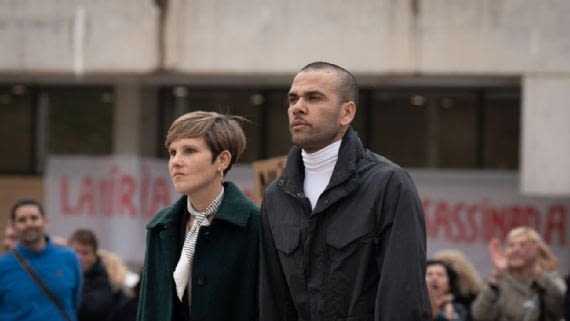Dani Alves’ Conviction Overturned: A Deep Dive into the Case and Its Implications
In a dramatic turn of events, Brazilian soccer star Dani Alves has won his appeal against a sexual assault conviction. A Spanish court overturned the ruling on Friday, bringing an end to a legal saga that has spanned over three years. This case has been a rollercoaster of emotions and legal battles, with Alves spending 14 months behind bars. The former Barcelona defender was initially found guilty in February 2024 of raping a woman in a nightclub in December 2022 and was sentenced to 4½ years in prison. Throughout the three-day trial, Alves maintained his innocence.
The court’s decision on Friday was based on the finding of “insufficient evidence” to dismiss Alves’ presumption of innocence. This ruling has sparked a wave of reactions, with Alves’ defense lawyer, Inés Guardiola, expressing relief and satisfaction. “Dani Alves is innocent, and that has been proven,” she told Catalan radio RAC1. “Justice has finally been served.”
On the other side, the plaintiff’s lawyer has remained silent, not responding to requests for comments from The Associated Press. This silence leaves many questions unanswered, especially for those who have been following the case closely.
This trial was particularly significant as it was the first high-profile case since Spain revamped its laws in 2022 to make consent a central element in defining a sex crime. This legislative change was a response to widespread protests following a gang rape case during the San Fermin bull running festival in Pamplona in 2016. The “only yes means yes” law defines consent as an explicit expression of a person’s will, emphasizing that silence or passivity does not equate to consent.
Despite the new legal framework, the four judges of the Barcelona-based appeals court unanimously decided to overturn the conviction. They cited discrepancies between the plaintiff’s testimony and video evidence from the nightclub. The footage reportedly showed a different narrative from what the woman described, particularly before she and Alves entered the bathroom where the alleged assault took place.
Before the trial, the woman had informed state prosecutors that she danced with Alves and willingly entered the bathroom. However, she claimed that once inside, Alves prevented her from leaving, slapped her, insulted her, and forced her to have sex against her will. Alves, during the trial, denied these accusations, stating, “She never told me to stop. We were both enjoying ourselves.” He insisted that the woman never indicated a desire to leave or that she did not want to engage in sexual activity with him. He also denied any physical or verbal abuse.
Alves, now 41, was incarcerated from January 20, 2023, to March 2024. He was released after posting a bail of 1 million euros (then $1.2 million) while awaiting his appeal. As part of his bail conditions, he surrendered his passports, with prosecutors arguing against his release due to the potential flight risk.
Prosecutors had sought to increase his prison sentence to nine years, while the woman’s lawyer pushed for a 12-year sentence. The recent court decision, however, could still be challenged in the Spanish supreme court in Madrid, leaving the door open for further legal proceedings.
Alves’ career has been nothing short of illustrious. He is regarded as one of the most successful players of his generation, having won numerous titles with top-tier clubs such as Barcelona, Juventus, and Paris Saint-Germain. At the time of his arrest, he was playing for Liga MX club Pumas, which terminated his contract immediately following the arrest.
- The case highlights the complexities of legal proceedings in sexual assault cases, especially under new consent laws.
- It underscores the importance of video evidence in court rulings.
- The decision may have broader implications for future cases under Spain’s “only yes means yes” law.
As the dust settles on this chapter of Dani Alves’ life, the world watches closely to see what the next steps will be, both for him and for the legal system that has been tested by this high-profile case.
Originally Written by: Associated Press





















